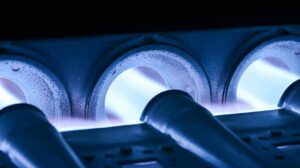
Any natural gas-burning appliance in a house has the potential to become hazardous. This is true of any appliance that burns any type of fuel. Electrical devices can create dangers from high voltage shocks or electrical fires.
This is a way of showing that, although a gas furnace can present dangers for a house, it isn’t much different in that way than many other appliances you use regularly. Because of the power of gas furnaces, people often find them intimidating and worry about them more—but if they were significant dangers, they would never be allowed into residential homes in the first place.
Your gas furnace can create hazards for your house, but you can prevent most of them through some basic steps. Modern gas furnaces are built to high standards of safety, and with the proper attention, you can minimize the possible harm to almost nothing. That’s what we’ll focus on in the rest of this post.
Maintenance is the best tool for gas furnace safety
If you want to lower the chance of a safety problem with your gas furnace to as close to zero as possible, always schedule professional maintenance for it each year, preferably in the fall before you begin using it the most. A key part of professional maintenance on a gas furnace is a safety inspection. Technicians make checks on safety mechanisms to ensure they’re working, test the gas pressure and look for gas leaks, examine the gas valves, and inspect the heat exchanger for signs of corrosion and cracks. This last step is the most critical since cracked heat exchangers are the most common way for a furnace to start to leak toxic carbon monoxide into a home’s air.
If the technicians find anything wrong with the furnace, they’ll inform you and recommend the adjustments or repairs necessary to keep the heater running safely. In extreme cases, they may tell you to have the furnace replaced.
Never delay with repairs
When your furnace starts to malfunction, don’t try to “wait it out” or procrastinate because the weather is starting to warm up. A malfunctioning furnace can become dangerous, even if the problem outwardly doesn’t seem terrible. Always call our technicians promptly for furnace repair in Conyers, GA to ensure any malfunction doesn’t worsen. We recommend shutting the furnace off at the furnace switch while waiting for one of us to arrive.
Have carbon monoxide detectors in your rooms
If you use natural gas in any way in your house, you need several CO detectors in key locations to provide an early warning of a rise in carbon monoxide levels. You can leave your house before the levels become harmful and call the gas company to check on the problem. (Don’t call us for repairs until after the gas company has given you an “all clear.”)
Replace an over-the-hill furnace
Don’t try to push a gas furnace too far past its manufacturer’s estimated service life, even if it still seems to be working. The standard life expectancy for a gas furnace is 15 years. After this point, there’s a larger chance of corrosion and poor ventilation that will make the furnace unsafe.
Experience the Premier Difference! Premier Heating & Air has been family-owned and operated since 2001.

